The 6th WASWAC World Conference was successfully
convened in Rabat, Morocco, from 15 to 17 September 2025.
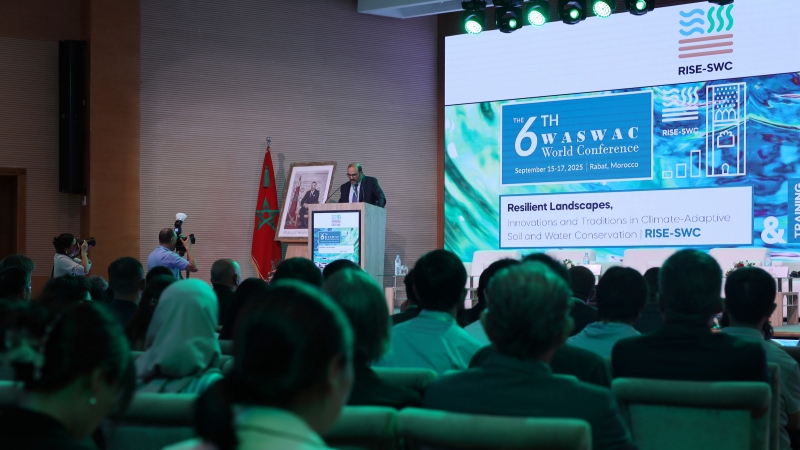
This conference was organized by the World Association
of Soil and Water Conservation (WASWAC) and hosted by the National
Institute of Agricultural Research (INRA). Supporting institutions
included the Chinese Society of Soil and Water Conservation (CSSWC), FAO Global
Soil Partnership (GSP), the International Center for Agricultural Research in
the Dry Areas (ICARDA), OCP Nutricrops, International Water Management
Institute (IWMI), African Plant Nutrition Institute (APNI), Institut
agronomique et vétérinaire Hassan-II (IAV
Hassan-II), Université Mohammed VI Polytechnique (UM6P), National School of
Agriculture of Meknes (ENA), Shenyang Agricultural University (SYAU), Jiangxi
Academy of Water Science and Engineering (JAWSE), Institute of Soil and Water
Conservation of CAS & MWR.
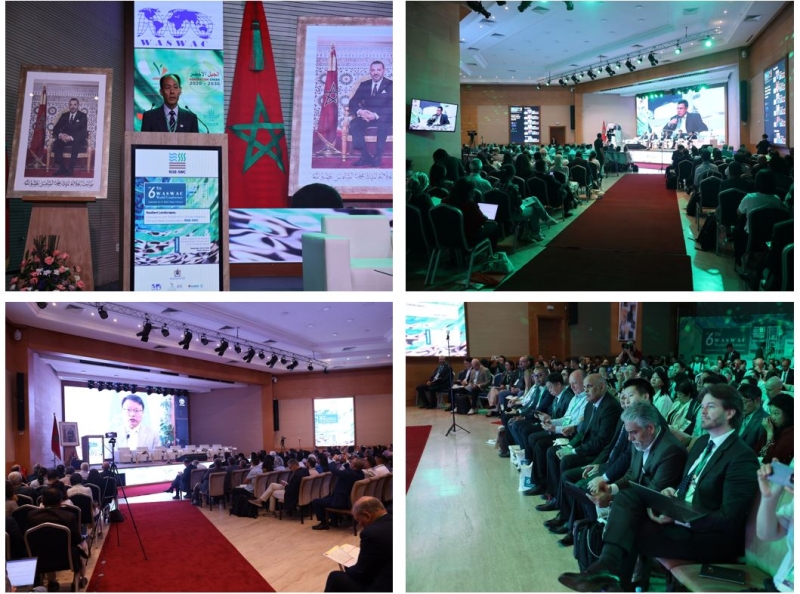
At the opening ceremony held on 15 September, Prof.
Duihu Ning, President of WASWAC, Leonardus Vergutz, Chief Scientific Officer of
OCP Nutricrops, and Vinay Nangia, head of the research team at the
International Center for Agricultural Research in the Dry Areas (ICARDA)
attender and delivered welcoming addresses. Dr. Lifeng Li, Director of the FAO
Land and Water Division, delivered a video address, emphasizing that soil
erosion is not merely an environmental issue but also poses a direct threat to
food security, drinking water quality, rural livelihoods, and ecosystem
resilience.
This theme of this conference is “Resilient
Landscapes: Innovations and Traditions in Climate-Adaptive Soil and Water
Conservation (RISE-SWC)”, including 17 invited presentations, 99 oral
presentations, and 81 poster presentations. Attending experts and scholars
engaged in in-depth exchanges and discussions on key topics: Impact of climate
change on soil erosion and coping strategies; The role of water resources
management in addressing climate change; Challenges and opportunities of land
use planning and management in the context of climate change; Integration of
traditional wisdom and modern technology in soil and water management; Social
and economic considerations in soil and water management; Strategic shifts in
soil and water conservation practices and technologies to address climate
change; Monitoring and early warning mechanisms in soil and water management.
In two keynote panels themed "Climate Change and Soil-Water
Security" and "Embedding Soil Health and Smart Water Management at
the Core of Science-based Policy Development, Innovative Funding, and
Agricultural Research Priorities", Prof. Duihu Ning, President of WASWAC, Prof.
Leonardus Vergutz, Chief Scientific Officer of the OCP Nutricrops, Prof. Nangia
Vinay, Dirctor of GCZSC-UM6P, Dr. Kaushik Majumdar, Director General of APNI,
Dr. Vinay Nangia, Research Team Leader of ICARDA, Prof. Baoyuan Liu, Vice
President of WASWAC, and Tarik Benabdelouahab, Head of Department in INRA, attended
discussion. They emphasized the role of technological innovation in controlling
soil erosion and reducing the agricultural carbon footprint, while calling for
enhanced international cooperation and effective measures to combat land
degradation and desertification, thereby safeguarding soil and water resources.
In line with the conference theme, five side events
were held during the conference, FAO Side event: Launch of International
Network on Soil Erosion-INSER, New visions for sustainable soils in Africa,
Soil assessment and management for a resilient landscape in Africa, New
initiatives for sustainable farming system and soils health and feedback from
NARS and partners, PRIMA EU. These sessions delved into integrating soil
erosion prevention into public policy, global soil erosion mapping initiatives,
integrated watershed management, and global soil erosion research and
monitoring. They offered fresh perspectives for soil conservation strategies
across Africa, the Mediterranean area, and the whole world.
On the 17th, a delegation of participants undertook a
field visit to the regional center for agronomic research of Kenitra. This
provided an in-depth understanding of the station methodologies and
achievements in sustainable soil and water management.
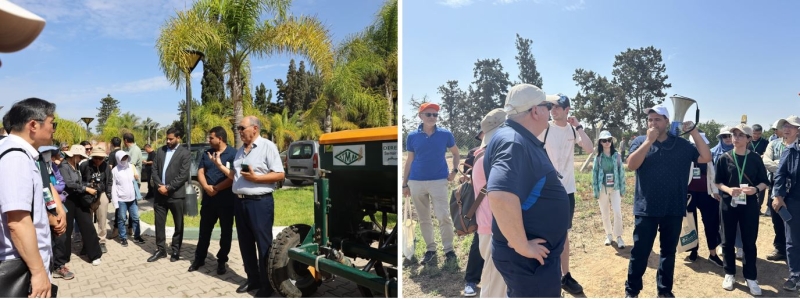
Following the conference, Prof. Rachid Moussadek from
the National Institute of Agricultural Research (INRA), Prof. Dennis
Flanagan from Purdue University, and Prof. Valentin Golosov from Moscow State
University were invited to conduct a training programme for 60 participants.
The programme focused on enhancing young scientists' capacity to undertake soil
and water conservation work in response to climate change. The two-day
programme systematically covered three key areas include soil erosion by water
at the global and regional levels, innovative modelling tools for soil and
water conservation, and innovative tools for soil and water conservation
research. This comprehensive approach expanded the knowledge base of young
researchers and enhanced their capacity to address soil and water conservation
challenges within the context of climate change.
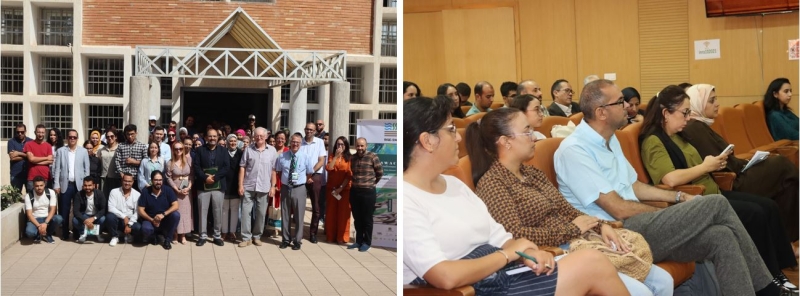
During the conference, two administrative meetings
were also organized including WASWAC Council Meetings and the Editorial Board Meeting
of its journal, International Soil and Water Conservation Research. Prof.
Qingbin Pan and Prof. Paige Chyu reported on the work undertaken by the WASWAC
Secretariat over the past three years and the achievements of the journal,
respectively. Council members and editorial board members in attendance
exchanged views and discussed matters pertaining to the association and the
journal.
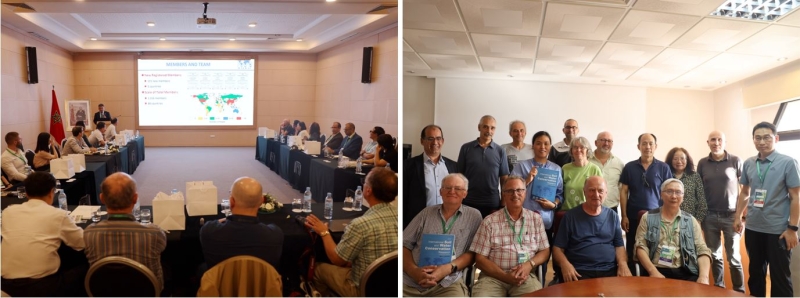
This conference was attended by nearly 500 experts and
scholars from 21 countries, including China, the United States, Germany,
France, the United Kingdom, Australia, Russia, Spain, Portugal, Italy, Greece,
Serbia, the Czech Republic, Cyprus, Turkey, Iran, India, Nigeria, Egypt,
Zimbabwe, and Morocco.

